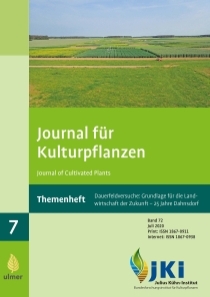Long-term field trials on the necessary need of insecticide applications in winter oil seed rape – Lessons learned from 25 years of experiments
DOI:
https://doi.org/10.5073/JfK.2020.07.05Keywords:
Winter oil seed rape, insecticides, pests, yield, environmental riskAbstract
In long-term field trials at the Dahnsdorf (Fläming) site, investigations have been carried out since 1995 to estimate the necessary level of insecticide application in winter oil seed rape (WOSR) and to develop sustainable insecticide strategies. Within the scope of the trial “Comparison of strategies – environmentally sound crop protection”, two different insecticide strategies were compared in WOSR in three trial phases, each of which differed in intensity. The aim of this paper was to compare and discuss these insecticide intensities and their yield and environmental effects against the background of the annual infestation pressure. The evaluation showed that in 21 of 22 trial years considered, insecticide measures were necessary in WOSR, the intensity of which fluctuated considerably due to weather conditions and infestation pressure. It could be shown that a reduction of treatment intensity by 50% to 60% did result in significant yield losses only during the first trial phase. The comparison of the environmental impacts, calculated with the risk indicator model SYNOPS-GIS, showed that the reduction in treatment intensity was accompanied by a reduction in environmental risk over many years. However, individual cases showed that this was not always true and that the choice of agent or active ingredient was also of decisive importance. The results underline the importance of using available decision support tools in crop protection such as infestation controls, warning service, forecasting models and success monitoring to reduce the use of insecticides in WOSR to the necessary need.
Downloads
Published
Issue
Section
License
The content of the journal is licensed under the Creative Commons Attribution 4.0 License. Any user is free to share and adapt (remix, transform, build upon) the content as long as the original publication is attributed (authors, title, year, journal, issue, pages).
The copyright of the published work remains with the authors. The authors grant the Journal of Cultivated Plants, the Julius Kühn-Institut and the OpenAgrar repository the non-exclusive right to distribute and exploit the work.







